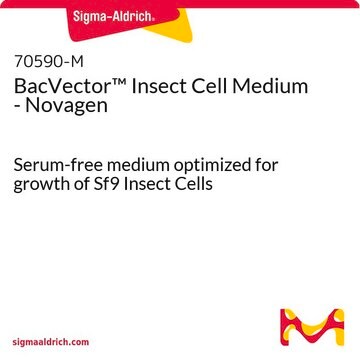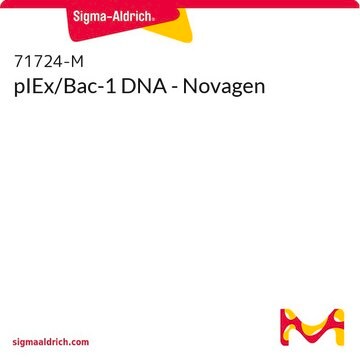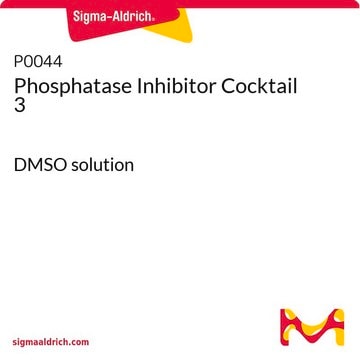おすすめの製品
品質水準
フォーム
suspension
メーカー/製品名
Novagen®
保管条件
OK to freeze
テクニック
transfection: suitable
輸送温度
wet ice
保管温度
2-8°C
詳細
Insect GeneJuice<TMSYMBOL></TMSYMBOL> Transfection Reagent is a proprietary liposome formulation optimized for maximal transfection efficiency of Sf9 insect cells. The reagent features extremely low toxicity to the cells and can be used for both transient and stable transfections in serum-containing or serum-free media, and for cotransfection of transfer plasmids with linearized virus DNA for the production of recombinant baculoviruses. Insect GeneJuice is ideal for large-scale protein expression in suspension-culture transfections of Sf9 insect cells when using pIEx<TMSYMBOL></TMSYMBOL> and pBiEx<TMSYMBOL></TMSYMBOL> vectors, which contain the immediate early baculovirus promoter, IE1.
Insect GeneJuice Transfection Reagent is provided as a 2 mg/ml suspension in 20 mM MES, 150 mM NaCl, pH 6.2 buffer. One ml is sufficient for 12 or 125 transfections in 10-ml suspension culture flasks or 35-mm plates, respectively.
- When Insect Genejuice® used in conjunction with Sf9 cell line, raw relative light units (RLUs) from Renilla Luciferase expression with plex is 131,90 Vs. 75,726 when other reagent used with Sf9, thus 1.7 fold difference.
- When Insect Genejuice® used in conjunction with Sf9 cell line, raw relative light units (RLUs) from Renilla Luciferase expression with plex is 131,90 Vs. 11,952 when other reagent used with High Five, thus 11 fold difference.
- When Insect Genejuice® used in conjunction with Sf9 cell line, raw relative light units (RLUs) from Renilla Luciferase expression with plex is 131,90 Vs. 31,897 when Insect Genejuice used with High Five, thus 4.1 fold difference.
Insect GeneJuice Transfection Reagent is provided as a 2 mg/ml suspension in 20 mM MES, 150 mM NaCl, pH 6.2 buffer. One ml is sufficient for 12 or 125 transfections in 10-ml suspension culture flasks or 35-mm plates, respectively.
警告
Toxicity: Standard Handling (A)
法的情報
GeneJuice is a registered trademark of EMD Biosciences, Inc., Madison, WI USA
GENEJUICE is a registered trademark of Merck KGaA, Darmstadt, Germany
NOVAGEN is a registered trademark of Merck KGaA, Darmstadt, Germany
保管分類コード
12 - Non Combustible Liquids
WGK
WGK 1
引火点(°F)
Not applicable
引火点(℃)
Not applicable
適用法令
試験研究用途を考慮した関連法令を主に挙げております。化学物質以外については、一部の情報のみ提供しています。 製品を安全かつ合法的に使用することは、使用者の義務です。最新情報により修正される場合があります。WEBの反映には時間を要することがあるため、適宜SDSをご参照ください。
Jan Code
71259-10ML:
71259-1ML:
71259-5:
71259-EA:
71259-3:
71259-ML:
71259-50UL:
71259-4:
71259-.3ML:
試験成績書(COA)
製品のロット番号・バッチ番号を入力して、試験成績書(COA) を検索できます。ロット番号・バッチ番号は、製品ラベルに「Lot」または「Batch」に続いて記載されています。
この製品を見ている人はこちらもチェック
Chigang Chen et al.
PloS one, 8(9), e73912-e73912 (2013-09-17)
Xanthine oxidoreductase (XOR) is a cytoplasmic molybdenum-containing oxidoreductase, catalyzing both endogenous purines and exogenous compounds. It is suggested that XOR in porcine hepatocytes catalyzes the N-oxide reduction of quinoxaline 1,4-di-N-oxides (QdNOs). To elucidate the molecular mechanism underlying this metabolism, the
Frauke Hussmann et al.
Scientific reports, 6, 20653-20653 (2016-02-13)
Alp14 is a TOG-family microtubule polymerase from S. pombe that tracks plus ends and accelerates their growth. To interrogate its mechanism, we reconstituted dynamically unstable single isoform S. pombe microtubules with full length Alp14/TOG and Alp7, the TACC-family binding partner
Ylva C Strandberg Lutzow et al.
BMC veterinary research, 4, 18-18 (2008-06-03)
Mastitis in dairy cattle results from infection of mammary tissue by a range of micro-organisms but principally coliform bacteria and Gram positive bacteria such as Staphylococcus aureus. The former species are often acquired by environmental contamination while S. aureus is
Shinji Kasai et al.
PLoS neglected tropical diseases, 8(6), e2948-e2948 (2014-06-20)
Aedes aegypti is the major vector of yellow and dengue fevers. After 10 generations of adult selection, an A. aegypti strain (SP) developed 1650-fold resistance to permethrin, which is one of the most widely used pyrethroid insecticides for mosquito control.
Kittikhun Wangkanont et al.
The Journal of biological chemistry, 291(11), 5596-5610 (2016-01-13)
Intelectins (X-type lectins), broadly distributed throughout chordates, have been implicated in innate immunity. Xenopus laevis embryonic epidermal lectin (XEEL), an intelectin secreted into environmental water by the X. laevis embryo, is postulated to function as a defense against microbes. XEEL
ライフサイエンス、有機合成、材料科学、クロマトグラフィー、分析など、あらゆる分野の研究に経験のあるメンバーがおります。.
製品に関するお問い合わせはこちら(テクニカルサービス)














